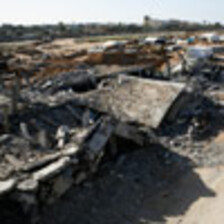The Electronic Intifada 9 January 2009
CAIRO (IPS) - Egyptian authorities have almost fully sealed the border with Gaza, preventing delivery of desperately needed humanitarian aid.
“The government has expressly forbidden the entry of aid convoys laden with food into the Gaza Strip,” Emmad al-Din Moustafa, member of the Popular Committee for Aiding Gaza told IPS. “The continued border closure — like the Israeli assault itself — constitutes a crime against humanity.”
Israel began a series of devastating air strikes on targets throughout the Israeli-occupied Gaza Strip on 27 December, followed by a ground offensive launched 3 January. According to Israeli officials, the campaign, which has included thousands of air strikes and naval bombardment, comes in retaliation for rockets fired at Israel by Gaza-based Palestinian resistance factions.
Since the campaign began, humanitarian aid — donated by sympathizers from across the Arab and Islamic world — has flown into the city of al-Arish, 40 kilometers west of Egypt’s border with the Gaza Strip. But according to local sources, Egyptian authorities are preventing the transportation of food and medicine into the besieged territory.
“The crossing has only been opened briefly five or six times to allow the entry of limited amounts of aid,” Hatem al-Bulk, political activist from al-Arish told IPS. “About 1,000 tons of food have been delivered so far, but the population of Gaza needs an estimated 1,500 tons per day to survive.”
Even before the Israeli onslaught, the Gaza Strip had been subject to a crippling, internationally sanctioned embargo that destroyed its economy and brought it to the brink of humanitarian disaster.
Since the Palestinian resistance movement Hamas seized control of the Gaza Strip in the summer of 2007, after winning elections in 2006, Egypt — like Israel, the occupying power — has kept its border with the enclave tightly shut. In tandem with the neutralization of airports and maritime ports, the border closures have deprived Gaza’s 1.5 million inhabitants of most essential goods, including food, medicine and fuel.
Egypt says it cannot reopen the Rafah crossing — the sole transit point along its roughly 14-kilometer border with the Gaza Strip — in the absence of Palestinian Authority officials and EU observers, under a 2005 security agreement.
“Egypt doesn’t want to sanctify the division [between the Hamas run Gaza Strip and the Palestinian Authority run West Bank] by opening the Rafah crossing in the absence of the PA and European observers,” President Hosni Mubarak said 30 December.
According to some Egyptian officials, the border has been opened when it has been safe to do so.
“The Rafah crossing is open for the entry of humanitarian aid and to receive the injured,” North Sinai Governor Gen. Mohamed Abdel Fadil was quoted as saying in the Wednesday (7 January) edition of state daily al-Gomhouriya. “The crossing is only being closed during heavy Israeli bombardment of the Palestinian side.”
Fadil added that Egypt had received 130 injured Palestinians for treatment in Egyptian hospitals since the outset of the campaign, and was prepared to receive many more. More than 3,000 people are lying injured in Gaza, besides more than 700 killed.
Local sources confirm that the Palestinian side of the Rafah crossing has come under frequent Israeli attack since the campaign began.
“The Palestinian side has been hit several times with earth-penetrating munitions, ” said al-Bulk. “Egyptian Rafah has become a ghost town because so many residents have left for al-Arish and other cities in the Sinai Peninsula.”
Meanwhile, local activists say the situation in the Gaza Strip has become dire.
“Many Gazans can’t find food,” said Moustafa, who is in regular contact by telephone with several families across the border. “If the situation doesn’t drastically improve in the next three days, people will starve to death. Meanwhile 50,000 tons of food is sitting in al-Arish, awaiting the authorities’ permission to make the crossing. Where are the international humanitarian institutions, like the UN?”
Doctors and medical experts have been barred from entering the Gaza Strip. On Tuesday (6 January), a group of 55 Egyptian medical volunteers of varying specialties from universities throughout the country were prevented from crossing into Gaza.
“Although we signed a statement saying we were responsible for our own safety, the border authorities at Rafah refused us entry without explanation,” Yasser Mohamed, a heart surgery specialist at Cairo University and one of the medical volunteers, told IPS from al-Arish. “Shortly afterwards, the minister of health — who happened to be in the area — told us we couldn’t enter Gaza because ‘Israel had not given its approval.’”
“Doctors in Gaza, who are usually trained only in general medicine, are in desperate need of our skills,” added Mohamed. “If we were let in, we could save lots of lives.”
According to al-Bulk, security forces on the Egyptian side of the Rafah crossing are leaving nothing to chance.
“Police forces in Rafah and al-Arish have been beefed up substantially since the Israeli campaign began,” he said. “And they have orders to fire on anyone attempting to breach the border.”
All rights reserved, IPS - Inter Press Service (2009). Total or partial publication, retransmission or sale forbidden.
Related Links


